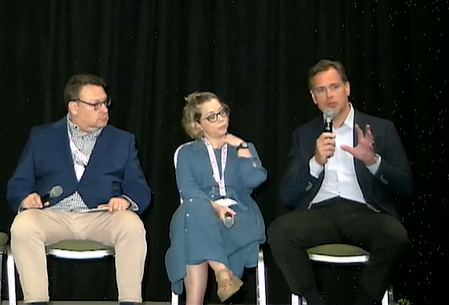Elevating the compliance officer’s role

Expert panel discusses the keys to take the function from gatekeeper to strategic business partner.
Combined surveys of compliance professionals conducted at Informa Life Sciences compliance events in 2024 found that while 43% responded that they have touchpoints with every department across their company, 33% are concerned they don’t have enough scope across the organization.
A complex regulatory environment, wrapped along with the HHS OIG General Compliance Program Guidance released a little over a year ago, has provided a robust and evolving approach to the life sciences compliance officer’s role. The panel convened at Pharmaceutical Compliance Congress West shared the following insights on how to become a strategic partner in the business.
 From left to right, Eric Rogers, Alexion RDU + AstraZeneca Japan; Sara Blessing, Ionis Pharmaceuticals and Daryl Kreml, Sage Therapeutics.
From left to right, Eric Rogers, Alexion RDU + AstraZeneca Japan; Sara Blessing, Ionis Pharmaceuticals and Daryl Kreml, Sage Therapeutics.
Align with business objectives. Daryl Kreml, Chief Enterprise Risk and Compliance Officer for Sage Therapeutics, said, “The overarching approach to being a business partner is understanding the strategic imperatives in an organization, and the annual goals as a company. What is the CEO and leadership team being measured against and held accountable to by the board? And how can you - as a member of the compliance team - buy into and support those objectives that they care about?"
This approach, said Kreml, helps build trust and support from leadership, enabling compliance officers to be more effective in their roles.
Relationship building. Eric Rogers, Vice President, Ethics & Compliance, Alexion RDU + AstraZeneca Japan, highlighted the significance of relationship-building.
"I look at the compliance function as being often a connector. You have the privilege of working with everybody at the line level--sales people up to the C suite, and everyone in between. You play the role of confessor or listener but also being a conduit to a lot of things."
Rogers emphasized that building relationships and making connections offers allows compliance officers to show an understanding of the business and that compliance can work in collaboration with them.
Emotional intelligence. Sara Blessing, Director, Compliance Counsel at Ionis Pharmaceuticals, said, "What can really differentiate us in our success as a compliance officer is our emotional intelligence. At the end of the day, our success is how we interact with our clients, our teams, our business partners, and how well we engage with them."
Blessing noted that being approachable and a good listener can help compliance officers become more effective leaders and partners within their organizations.
Data in compliance
The panelists also discussed the importance of data analytics in elevating the compliance function. Whether the data is fully available or has to be cobbled together, data can be used to guide compliance offers.
Rogers suggested: "Try to make as much as you can from the native business management rather than the special compliance function. And then, as you get more mature and your data lake starts to emerge, look for ways to pull from it and inform what you think of for risk."
Kreml offered this practical starting point for companies new to data analytics: "If you have a marketed product, just take your top 10 recipients in your sunshine spend last year, and then get from your sales team, your top 10 prescribers. Lay those down beside each other and see how much overlap there is and then go meet and ask questions about why."
Blessing said, “We just completed a data mapping exercise with our IT team to understand every system that may hold data that we want access to that may help us and we've partnered with finance it, legal ops, and commercial op to utilize reports they're already pulling.” Blessing noted that they are looking to bring on someone with a data analytics background to help operationalize that for the team.
The panel also discussed how to determine your company’s risk tolerance, reporting structures and more. Learn more about building the compliance function relationship and other topics are our upcoming conference.
Quotes have been lightly edited for clarity.